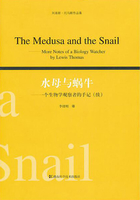Ancient law furnishes other proofs that the earliestadministrators of justice simulated the probable acts of personsengaged in a private quarrel. In settling the damages to beawarded, they took as their guide the measure of vengeance likelyto be exacted by an aggrieved person under the circumstances ofthe case. This is the true explanation of the very differentpenalties imposed by ancient law on offenders caught in the actor soon after it and on offenders detected after considerabledelay some strange exemplifications of this peculiarity aresupplied by the old Roman law of Theft. The Laws of the TwelveTables seem to have divided Thefts into Manifest andNon-Manifest, and to have allotted. extraordinarily differentpenalties to the offence according as it fell under one head orthe other. The Manifest Thief was he who was caught within thehouse in which he had been pilfering, or who was taken whilemaking off to a place of safety with the stolen goods; the TwelveTables condemned him to be put to death if he were already aslave, and, if he was a freeman, they made him the bondsman ofthe owner of the property. The Non-Manifest Thief was he who wasdetected under any other circumstances than those described; andthe old code simply directed that an offender of this sort shouldrefund double the value of what he had stolen. In Gaius's day theexcessive severity of the Twelve Tables to the Manifest Thief hadnaturally been much mitigated, but the law still maintained theold principle by mulcting him in fourfold the value of the stolengoods, while the Non-Manifest Thief still continued to pay merelythe double. The ancient lawgiver doubtless considered that theinjured proprietor, if left to himself, would inflict a verydifferent punishment when his blood was hot from that with whichhe would be satisfied when the Thief was detected after aconsiderable interval; and to this calculation the legal scale ofpenalties was adjusted. The principle is precisely the same asthat followed in the Anglo-Saxon and other Germanic codes, whenthey suffer a thief chased down and caught with the booty to behanged or decapitated on the spot, while they exact the fullpenalties of homicide from anybody who kills him after thepursuit has been intermitted. These archaic distinctions bringhome to us very forcibly the distance of a refined from a rudejurisprudence. The modem administrator of justice has confessedlyone of the hardest tasks before him when he undertakes todiscriminate between the degrees of criminality which belong tooffences falling within the same technical description. It isalways easy to say that a man is guilty of manslaughter, larceny,or bigamy, but it is often most difficult to pronounce whatextent of moral guilt he has incurred, and consequently whatmeasure of punishment he has deserved. There is hardly anyperplexity in casuistry, or in the analysis of motive, which wemay not be called upon to confront, if we attempt to settle sucha point with precision; and accordingly the law of our day showsan increasing tendency to abstain as much as possible from layingdown positive rules on the subject. In France, the jury is leftto decide whether the offence which it finds committed has beenattended by extenuating circumstances; in England, a nearlyunbounded latitude in the selection of punishments is now allowedto the judge; while all States have in reserve an ultimate remedyfor the miscarriages of law in the Prerogative of Pardon,universally lodged with the Chief Magistrate. It is curious toobserve how little the men of primitive times were troubled withthese scruples, how completely they were persuaded that theimpulses of the injured person were the proper measure of thevengeance he was entitled to exact, and how literally theyimitated the probable rise and fall of his passions in fixingtheir scale of punishment. I wish it could be said that theirmethod of legislation is quite extinct. There are, however,several modern systems of law which, in cases of graver wrong,admit the fact of the wrong doer leaving been taken in the act tobe pleaded in justification of inordinate punishment inflicted onthem by the sufferer-an indulgence which, though superficiallyregarded it may seem intelligible, is based, as it seems to me,on a very low morality.
Nothing, I have said, can be simpler than the considerationswhich ultimately led ancient societies to the formation of a truecriminal jurisprudence. The State conceived itself to be wronged,and the Popular Assembly struck straight at the offender with thesame movement which accompanied its legislative action. it isfurther true of the ancient world though not precisely of themodern, as I shall have occasion to point out -- that theearliest criminal tribunals were merely subdivisions, orcommittees, of the legislature. This, at all events, is theconclusion pointed at by the legal history of the two greatstates of antiquity, with tolerable clearness in one case, andwith absolute distinctness in the other. The primitive penal lawof Athens entrusted the castigation of offences partly to theArchons, who seem to have punished them as torts, and partly tothe Senate of Areopagus, which punished them as sins. Bothjurisdictions were substantially transferred in the end to theHeliaea, the High Court of Popular Justice, and the functions ofthe Archons and of the Areopagus became either merely ministerialor quite insignificant. But "Heliaea" is only an old word forAssembly; the Heliaea of classical times was simply the PopularAssembly convened for judicial purposes, and the famousDikasteries of Athens were only its subdivisions or panels. Thecorresponding changes which occurred at Rome are still moreeasily interpreted, because the Romans confined their experimentsto the penal law, and did not, like the Athenians, constructpopular courts with a civil as well as a criminal jurisdiction.















